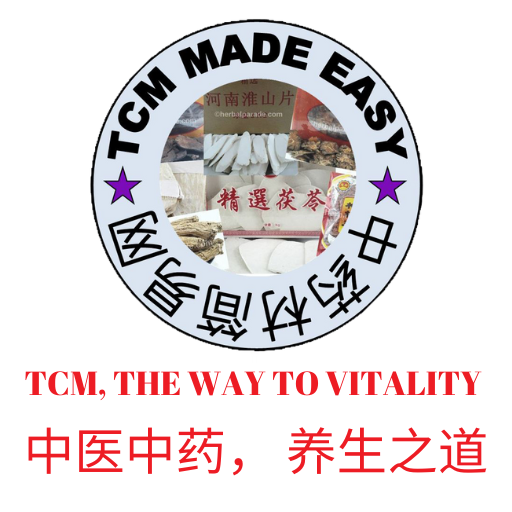Nourishment, The TCM Way | 中医中药养身之道
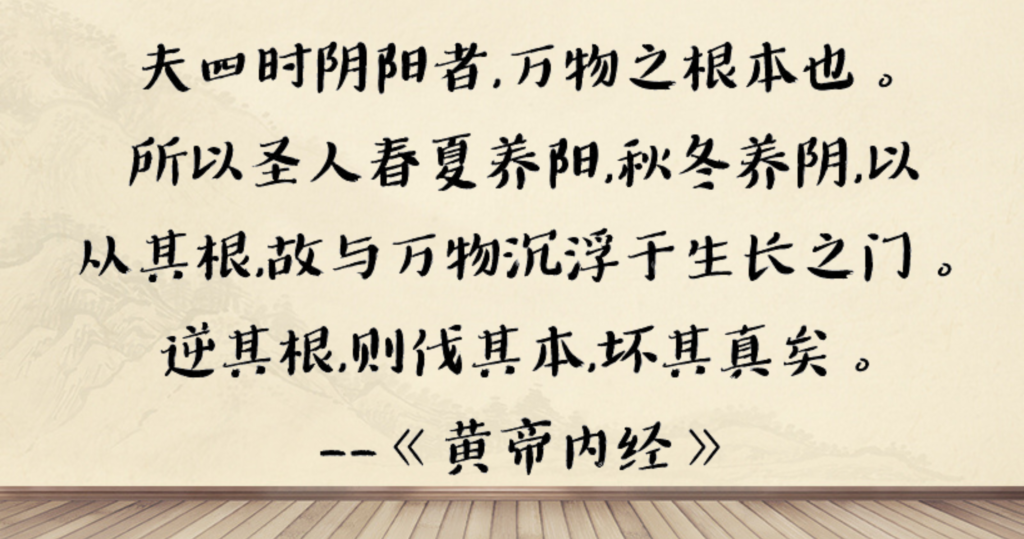
【Theory of Nourishment using Traditional Chinese Medicine】
The theory of Traditional Chinese Medicine (TCM) and Chinese herbal medicine for nourishing the body is based on TCM theories such as “yin-yang theory”, “five elements theory”, “qi-blood-jin-fluid theory”, and “organ-meridian theory”. Nourishing the body through TCM and Chinese herbal medicine is aimed at adjusting the balance of yin and yang, nourishing the organs, regulating qi, blood, jin, and fluid in the body to improve overall health and prevent diseases.
- Here are some methods and principles of nourishing the body in TCM and Chinese herbal medicine:
- Nourishing the body with food: Food is the main source of nutrients for the body. TCM advocates nourishing the body with food and selecting suitable ingredients and cooking methods according to different body constitutions and health conditions. For example, eating red dates, black sesame, wolfberry, and brown rice can supplement nutrients, promote blood circulation, and enhance immunity.
- Nourishing the body with herbs: Chinese herbal medicine emphasizes “preventing disease before it occurs”. Common Chinese herbs for nourishing the body include ginseng, astragalus, angelica, and wolfberry, which have the effects of tonifying qi, nourishing blood, strengthening the kidney, and regulating bodily functions to prevent disease.
- Nourishing the body with the spirit: Mental factors have an important impact on physical health. TCM emphasizes maintaining a cheerful mood, adjusting emotions, and enhancing immunity. Common methods include tai chi, qigong, and acupuncture.
- Seasonal nourishment: TCM believes that different seasons require different methods of nourishing the body. For example, in winter, warm and hot foods and herbs such as ginseng, wolfberry, and longan can be used to nourish the kidney yang and warm the body.
In summary, the principle of nourishing the body with TCM and Chinese herbal medicine is based on the theory of balancing the body’s yin and yang, regulating the body’s energy, nutrients, and spirit, and enhancing the body’s immune system to prevent disease and improve overall health.
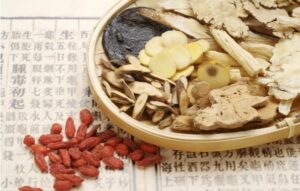
【Effects of Nourishment】
The effects of nourishing the body with Traditional Chinese Medicine (TCM) and Chinese herbal medicine are as follows:
- Enhancing physique: Nourishing the body with Chinese herbal medicine can improve the body’s immune system and enhance physique. Different Chinese herbs have different functions, such as ginseng, astragalus, codonopsis, and wolfberry, which can regulate bodily functions, improve physical strength, and enhance disease resistance, thereby making the body healthier.
- Nourishing organs: Nourishing the body with Chinese herbal medicine can regulate the function of organs, promote metabolism and physiological activities, and prevent and treat various chronic diseases, such as liver disease, kidney disease, and cardiovascular disease.
- Regulating qi, blood, jin, and fluid: Nourishing the body with Chinese herbal medicine can regulate the balance of qi, blood, jin, and fluid, nourish the body’s essence, energy, and spirit, and prevent and treat symptoms such as insomnia and fatigue.
- Preventing diseases: Nourishing the body with Chinese herbal medicine can improve the body’s health status and prevent various diseases such as colds, coughs, and indigestion.
In summary, nourishing the body with TCM and Chinese herbal medicine can promote health, enhance physique, improve physical conditions, and prevent diseases. It is a safe and effective method for health care.
【Common Knowledge of Nourishment】
Here are some common knowledge about nourishing the body with Traditional Chinese Medicine (TCM) and Chinese herbal medicine:
- The selection of Chinese herbs and ingredients for nourishing the body should be based on an individual’s physical condition and health status. It is best to seek guidance from a professional TCM practitioner.
- Do not consume too much Chinese herbal medicine at one time. It should be consumed in moderate amounts to avoid overburdening the body.
- Nourishing the body with Chinese herbal medicine should be a long-term practice, rather than a short-term solution.
- Chinese herbal medicine should not replace a normal diet but rather supplement it. Proper nutritional balance is important.
- Pay attention to hygiene and cleanliness when using Chinese herbal medicine to avoid contamination and infection.
- Some Chinese herbs have certain toxicity and side effects. They should be used under the guidance of a professional TCM practitioner and following the principle of rational drug use.
- Special populations such as pregnant women, children, the elderly, and patients with certain medical conditions should not self-nourish the body with Chinese herbal medicine. They should seek guidance from a professional TCM practitioner.
In summary, nourishing the body with TCM and Chinese herbal medicine is an important health care method, but it is essential to follow professional guidance and principles in the selection and use of Chinese herbal medicine to achieve the expected health benefits.
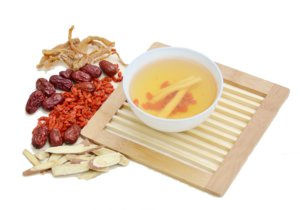
【Principle of Nourishment】
The principles of nourishing the body with Traditional Chinese Medicine (TCM) and Chinese herbal medicine include the following:
- Individualized approach: The selection of herbs and ingredients for nourishing the body should be based on an individual’s physical condition and health status. Different people have different needs.
- Small quantities and frequent consumption: It is not advisable to consume too much at once, and moderate consumption should be maintained over the long term.
- Reasonable combination: Nourishing the body with Chinese herbal medicine should be combined with a normal diet, following the principles of balanced nutrition. Avoid overly simple or unbalanced diets.
- Timing and moderation: The timing for nourishing the body should be personalized, and the appropriate time should be selected. Avoid blind or excessive consumption.
- Flexible preparation: Chinese herbal medicine for nourishing the body can be combined with various herbs and ingredients to meet individual needs.
- Consider the principle of “medicinal food homology”: Nourishing the body with TCM and Chinese herbal medicine should also pay attention to the combination of food and medicine, utilizing the nutritional components of food to promote the absorption and effectiveness of Chinese herbal medicine.
In summary, nourishing the body with TCM and Chinese herbal medicine should be based on an individualized approach, with a reasonable combination of herbs and ingredients, small quantities and frequent consumption, moderation in timing, flexible preparation, and consideration of the principle of “medicinal food homology”.
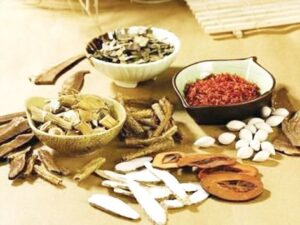
【Taboo of Nourishment】
There are also some taboo to nourishing the body with TCM and Chinese herbal medicine. Here are some points to keep in mind:
- People with certain medical conditions: For example, those with impaired liver or kidney function, high blood pressure, diabetes, etc., should undergo nourishing under the guidance of a doctor.
- Pregnant and lactating women: Should avoid nourishing the body to avoid affecting the health of the foetus and infant.
- Young children: Their bodies have not fully developed and should not consume large amounts of nourishing herbs and ingredients, and should also be guided by a doctor.
- People with allergies: Some Chinese herbs and food ingredients may cause allergic reactions, and should avoid nourishing the body.
- People undergoing drug treatment: For example, those undergoing chemotherapy, radiotherapy, etc., should undergo nourishing under the guidance of a doctor.
- Large amounts of certain Chinese herbs may have toxic side effects, and must be used under the guidance of professionals and strictly follow the dosage instructions.
- Excessive nutrition: Nourishing the body should be moderate, not excessively supplemented, to avoid excessive nutrition.
In summary, there are also some contraindications to nourishing the body with TCM and Chinese herbal medicine. It is necessary to undergo nourishing under the guidance of a doctor and pay attention to moderate nourishing to avoid adverse reactions.
【中医中药进补的原理】
中医中药的进补原理是基于中医理论中的“阴阳五行”、“气血津液”、“脏腑经络”等概念。进补就是通过补充营养物质来调节体内阴阳平衡、补益脏腑、调理气血津液,从而达到强身健体、预防疾病的目的。
以下是中医中药进补的原理和方法:
- 食补:食物是人体获取营养的主要来源,中医推崇食物进补,根据不同体质和病情选用适合的食材和烹饪方法。例如,食用红枣、黑芝麻、枸杞、糙米等可以补充营养,促进血液循环,提高免疫力。
- 药补:中药进补强调“治未病”,常用的中药有人参、黄芪、当归、枸杞子等,这些药物有温补、益气、养血、补肾等功效,可以帮助调节身体功能,预防疾病。
- 精神补:精神因素对身体健康有重要影响,中医强调保持心情舒畅,调整情绪,增强免疫力。常用的方法有太极拳、气功、针灸等。
- 季节补:中医认为四季不同,进补也需因时制宜。如冬季进补可选用温热性食物和药物,如人参、枸杞、桂圆等,以补肾阳、温暖身体。
总之,中医中药进补是根据人体阴阳平衡的理论,通过补益身体所需的能量、营养和精气神等,达到增强体质,预防疾病的目的。
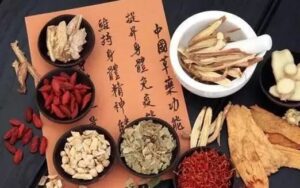
【医中药进补作用】
中医中药进补的作用主要有以下几个方面:
- 增强体质:中药进补可以提高人体的免疫力,增强体质。不同的中药有不同的作用,如人参、黄芪、党参、枸杞等可调节身体的机能,提高体力和抗病能力,从而使人体更健康。
- 补益脏腑:中药进补可以调节脏腑的功能,促进代谢和生理活动,防治各种慢性病,如肝病、肾病、心血管疾病等。
- 调理气血津液:中药进补可以调节气血津液的平衡,补益体内的精气神,防治失眠、疲劳等症状。
- 预防疾病:中药进补可以改善身体的健康状况,预防多种疾病,如感冒、咳嗽、消化不良等。
总之,中医中药进补可以促进人体的健康,增强体质,改善身体状况,预防疾病,是一种安全有效的保健方法。
【中医中药进补常识】
以下是一些关于中医中药进补的常识:
- 中药进补需要根据个人的体质和病情来选择不同的中药和食材,最好在专业中医师的指导下进行。
- 中药进补不宜一次性吃太多,应该适量搭配食用,避免对身体造成负担。
- 中药进补应该坚持长期服用,而不是一次性的短期补充。
- 中药进补不应该取代正常饮食,而应该作为饮食的补充,合理搭配膳食营养。
- 中药进补应该注意清洁卫生,避免污染和感染。
- 部分中药有一定的毒性和副作用,应该在专业医师的指导下使用,遵循合理用药的原则。
- 孕妇、儿童、老年人、病人等特殊人群不宜自行进补,应该在专业医师的指导下进行。
总之,中医中药进补是一种非常重要的健康保健方式,但是需要遵循专业的指导和原则,合理使用中药,以达到预期的保健效果。
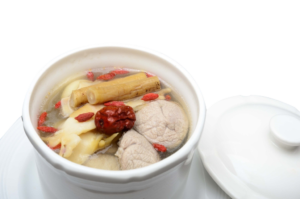
【进补原则】
中医中药进补的原则主要包括以下几点:
- 因人而异:进补应根据个人的体质和病情来选择合适的中药和食材,不同的人有不同的需要。
- 量少而频繁:不宜一次性吃太多,而应该适量搭配食用,并坚持长期服用。
- 搭配合理:中药进补应该搭配正常饮食,遵循膳食营养的原则,不要过于单一或偏食。
- 适时适度:进补的时机应该因人而异,选择合适的时间,不要盲目进行。
- 调配灵活:中药进补可以搭配多种不同的中药和食材,根据实际需要进行调配和组合。
- 考虑药食同源:中药进补应该注重食疗与中药的结合,利用食物的营养成分来促进中药的吸收和发挥作用。
总之,中医中药进补应该根据个人体质和病情,合理选择、搭配中药和食材,并注意量少而频繁、搭配合理、适时适度、调配灵活、药食同源等原则。
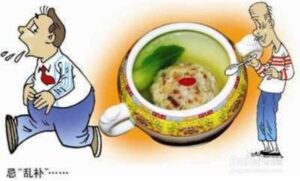
【进补的禁忌】
进补也有一些禁忌,需要注意以下几点:
- 患有某些疾病的人:如肝肾功能不全、高血压、糖尿病等,应在医生的指导下进行进补。
- 孕妇和哺乳期妇女:应该避免进补,以免影响胎儿和婴儿的健康。
- 年幼儿童:身体尚未发育完全,不宜大量进补,也应在医生的指导下进行。
- 过敏体质的人:对某些中草药和食材可能会产生过敏反应,应避免进补。
- 药物治疗中的人:如正在进行化疗、放疗等治疗,应在医生的指导下进行进补。
- 大量服用某些中草药会有毒副作用,必须在专业人士的指导下使用,并严格按照用药规定。
- 营养过剩:进补应适量,不要过度补充,以免导致营养过剩。
总之,进补也有一些禁忌,需要在医生的指导下进行,并注意适量进补,以免产生不良反应。

